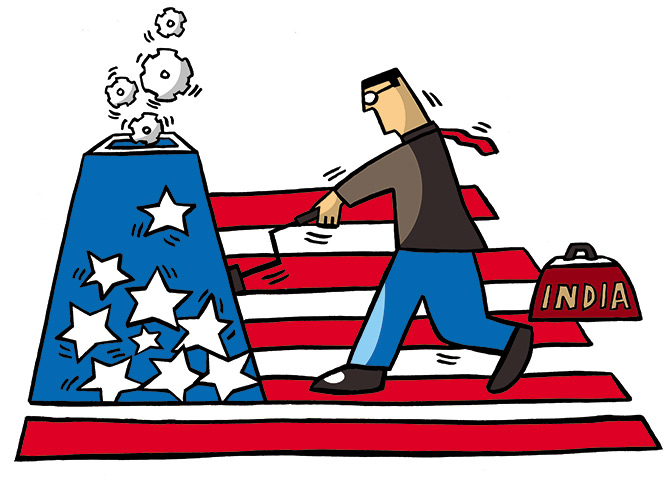 | « Back to article | Print this article |
Indian start-ups and software product companies are trying to attract engineers and programmers who are either stranded in India because of the lockdown or H-1B visa holders who have been laid off.

With the uncertain business environment triggered by the coronavirus (COVID-19) pandemic and immigration-related issues, many talented Indians in the US are being forced to return.
Start-ups and software companies are seeing this as an opportunity to enrich their talent base.
According to industry experts, a stricter visa regime and closure of onshore opportunities in the US are likely to result in a reverse brain drain.
Indian start-ups and software product companies are trying to attract engineers and programmers who are either stranded in India because of the lockdown or H-1B visa holders who have been laid off.
They are also setting sights on those who are contemplating moving back home due to uncertainties around the visa processing, say HR firms and industry experts.
“Product-based start-ups that have funds are luring mid-level workers having skills in front-end architect solutions and product development.
"The global exposure of such candidates is an added advantage," said Aditya Narayan Mishra, chief executive officer (CEO) of CIEL HR Services.
Last Monday, US President Donald Trump signed a proclamation to restrict H1B and other non-immigration visas until the end of 2020.
Around 1,500 visa holders, who visited India before the lockdown for medical emergencies and vacations, are also in limbo because of the executive order.
Also, the current Federal rules require an H-1B visa holder to leave the US along with family members within 60 days of losing their jobs.
Those on H-1B visas are not eligible for unemployment and social security benefits.
“Visa holders stuck in India, too, have been furloughed or given an option to temporarily work in offshore locations in Hyderabad or Bengaluru or transferred to other projects without the employee's consent.
"So, these employees are exploring local opportunities,” he added.
Indian start-ups such as Zomato and Ixigo have used the situation to draw talent returning from the US to fill their vacancies.
“Ixigo is seeking candidates in areas of engineering and quality assurance and we are open to Indian workers who could not get or renew their H-1B visas,” said Aloke Bajpai, CEO and co-founder of the Gurugram-based travel start-up.
Zomato's product head Rahul Ganjoo, too, took to the social media to point out that there were many opportunities in India.
Not only start-ups, but even IT service providers, health care and banking, financial services and insurance (BFSI) firms are said to be quite keen to hire the foreign returnees to fill up digital skills and cloud migration positions.
These are now fast-tracked due to the pandemic, according to Sunil C, head (specialized staffing), TeamLease Digital.
"Many H-1B holders, who will be returning due to the executive order, will form a good talent to fill immediate roles on contract.
"They can also fill consultant roles because they come from a market where such roles are well established," he added.
Reverse brain drain
The start-up community also feels the issue may act as a catalyst for “reverse brain drain” and may result in a new wave of start-ups similar to the ones set up by returnees in the previous decade.
Snapdeal co-founder and CEO Kunal Bahl’s H-1B visa was rejected in 2007 while working for Microsoft in Seattle.
However, he went on to start Snapdeal three years later along with his high school friend Rohit Bansal.
Snapdeal is now India's third-largest e-commerce retailer.
“India is the land of big opportunities. I didn’t know this 13 years ago when my H-1B visa was rejected, but haven’t regretted a moment since,” Bahl tweeted.